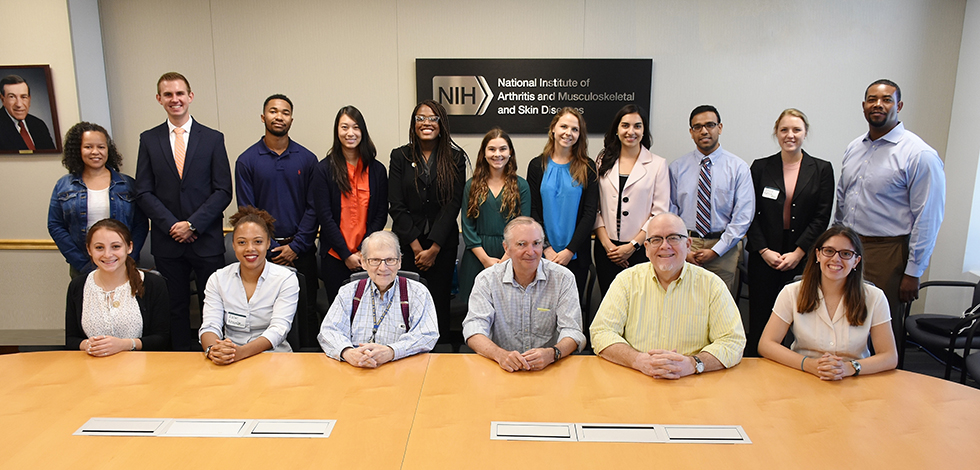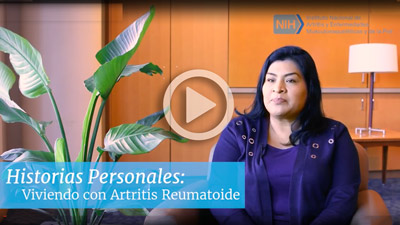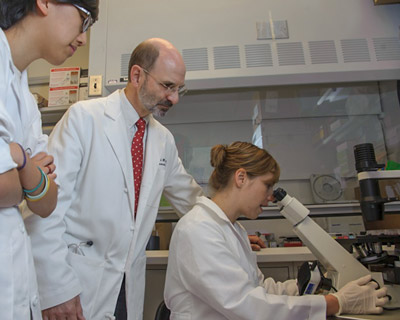Feature Stories

A Diverse Biomedical Workforce Is Essential for Healthy Communities
Almost every household in America is affected by diseases of the bones, joints, muscles and skin. These common and rare diseases affect people of all ages, racial and ethnic populations and economic status. Many of these conditions affect women and minorities disproportionately. The NIAMS at the National Institutes of Health (NIH) is dedicated to uncovering the bases for these disparities and creating effective strategies to treat and even prevent them.
“NIAMS is committed to promoting diversity in the biomedical, behavioral, clinical and social sciences workforce because it is important to have a workforce that better resembles the population that it serves. For example, many forms of arthritis, musculoskeletal and skin diseases disproportionately affect Americans from the same populations that have been identified as underrepresented in the biomedical research workforce. Individuals from these backgrounds have talents and insights that can be applied to the challenging research questions within the NIAMS mission. NIAMS leadership will continue to work closely with NIH as it supports talented and creative scientists, and potential scientists from all walks of life.”
— NIAMS Director Stephen I. Katz, M.D., Ph.D.
By working with members of the public like you to spread the word about our training programs and resources, we hope to continue supporting healthy, diverse communities.
2018 NIAMS Summer Students Look Back on Their Experiences
The 2018 NIAMS Scientific Summer Student Program accepted 16 interns from different regions of the United States based on their schooling and their proposed future contributions to the area of biomedical research specifically focused on NIAMS mission areas.
The students spent their summer immersed in innovative biomedical research (basic and translational), and participated in weekly themed career development seminars, journal clubs, clinical shadowing and independent seminars with NIAMS scientific and clinical directors, among many other activities.
Read what some of the 2018 summer trainees had to say about their experiences.

Photo credit: Colleen M. Dundas
News and Events
NEW! NIAMS Video in Spanish: Delia’s Story
 We recently added a new video to our collection of personal stories about participating in clinical research. In this video, Delia shares her story in her native language about her journey living with rheumatoid arthritis and her experience participating in clinical research at the NIH. The video is available with captions in English.
We recently added a new video to our collection of personal stories about participating in clinical research. In this video, Delia shares her story in her native language about her journey living with rheumatoid arthritis and her experience participating in clinical research at the NIH. The video is available with captions in English.
View other inspiring videos and resources on our Clinical Research page!
Volunteers Needed for Clinical Study in Lupus
 Systemic lupus erythematosus is an autoimmune disease that involves many systems and organs of the body. Symptoms can include fever, joint pain and rashes. Lupus can also damage organs such as the kidneys, lungs or brain. Drugs used for lupus can have serious side effects. Also, the drugs do not help some people. Researchers want to find new, more effective and safe treatments.
Systemic lupus erythematosus is an autoimmune disease that involves many systems and organs of the body. Symptoms can include fever, joint pain and rashes. Lupus can also damage organs such as the kidneys, lungs or brain. Drugs used for lupus can have serious side effects. Also, the drugs do not help some people. Researchers want to find new, more effective and safe treatments.
Studies of the Pathogenesis and Natural History of Systemic Lupus Erythematosus (SLE)
The purpose of this study is to identify clinical subsets of patients that might aid in understanding progress and determining appropriate therapies. View the flyer for this protocol and download to share [PDF – 590KB].
Featured Resources
Do you or someone you know want to gain research experience at the NIH?
 Share the following information with interested youth, students and recent graduates in your community! The NIAMS provides many opportunities to enhance research skills by working side by side with leading scientists in a collaborative and enriching environment with state-of-the-art facilities.
Share the following information with interested youth, students and recent graduates in your community! The NIAMS provides many opportunities to enhance research skills by working side by side with leading scientists in a collaborative and enriching environment with state-of-the-art facilities.
Student Research Training Programs
Find an array of programs for students of all levels, including high school students, undergraduates, postbaccalaureates and graduate and medical students.
Postdoctoral Research Training
Train with NIAMS scientists for up to 5 years in a mentored environment and with access to our core research facilities.
Clinical Fellowship and Rheumatology Training
Gain both clinical and laboratory experience. In some cases, Clinical Fellows may receive approved credit toward residency training, advanced subspecialty training or Board certification.
Scholars in Translational Research
Receive advanced training in rheumatology and related fields in genetics, immunology and inflammation biology after completing clinical training in adult or pediatric rheumatology.
Tenure and Tenure-Track Careers
Pursue a permanent position and a long-term commitment of salary, personnel and research resources to conduct an independent research program within the scope of the NIAMS' mission.
Image: Robert Colbert, M.D., Ph.D., Amy Petrik, Ph.D., and Grace Kwon, Ph.D., examine skin fibroblasts under a microscope.
Photo credit: Bill Branson, NIH Medical Arts
